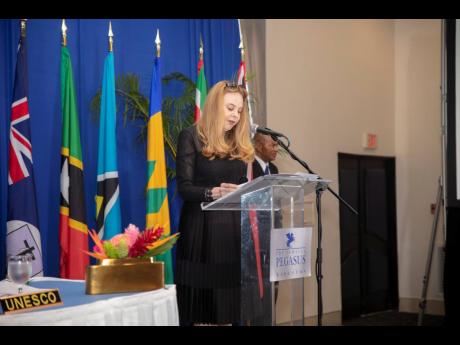Climate issues dominate UNESCO forum
Climate issues and the devastating impact of Hurricane Dorian, which severely affected The Bahamas, dominated conversations at The Caribbean Forum: Advocating for Small Island Developing States held last week at The Jamaica Pegasus.
The event, hosted by the United Nations Educational, Scientific and Cultural Organization (UNESCO) and the Ministry of Culture, Entertainment, Gender and Sports, provided dialogue on future action to tackle youth unemployment, climate change issues and support disaster preparedness for the Caribbean Small Island Developing States (SIDS).
Representatives from 23 UNESCO member countries and territories in the Caribbean attended the forum.
Minister of Culture, Entertainment, Gender and Sports Olivia ‘Babsy’ Grange, in her opening statement, said: “When the effects of climate change are added to the basket of social and economic woes that our young people experience, there is increased likelihood of developmental challenges as large portions of government budgets are redirected to crisis resolution and national reconstruction.”
Grange announced her ministry’s initiative, The Bahamas Hurricane Relief Concert, shortly after stating that the Jamaica Defence Force is currently in The Bahamas assisting with rescue and recovery.
“We will be hosting this concert on Saturday, November 2, at The National Stadium and we are mobilising the entertainment industry in Jamaica,” she said.
Mariko Kagoshima, United Nations resident coordinator, said: “This forum could not be timelier.”
She had recently returned from The Bahamas and said, “The erosion of property has left only bare land, leaving behind only memories of what was there before.”
Katherine Grigsby, director and representative of the UN Cluster Office for the Caribbean, provided some context from the UN Economic Commission on Latin America and the Caribbean (ECLAC). The UN ECLAC reports that between 1990 and 2014, there were 328 natural disasters recorded in the Caribbean, underscoring the need for more systematic response and resilience among SIDS, which are more vulnerable to extreme weather events.
“The impact of Hurricane Dorian over the Bahamas has once again proven that Caribbean SIDS are on the front line of natural disasters of climate change,” she said.
In the keynote speech, Dr Peggy Oti-Boateng, director of the Division of Science Policy and Capacity Building, UNESCO Paris, said:“We at UNESCO are grief-stricken by the loss of life in The Bahamas… and the livelihoods being lost due to an increasing unstable and unpredictable climate.”
Panel discussions
The Caribbean Forum also featured panel discussions with Alando Terrelonge, minister of state in the Ministry of Education, Youth and Information; Malgorzata Wasilewska, the ambassador and head of delegation of the European Union; Therese Turner-Jones, general manager of the Country Department Caribbean Group, Inter-American Development Bank; Cordel Green, executive director of the Broadcasting Commission of Jamaica; Dr Livingston White, director of the Caribbean School of Media and Communication; Renée Robinson, JAMPRO’s film commissioner; and Veronica Campbell-Brown, eight-time Olympic medallist and UNESCO Champion for Sport.
UNESCO, through The Caribbean Forum, is seeking synergies within the private and public sector to join forces for a collaborative effort in supporting common objectives to enhance sustainable development in the Caribbean.
As a part of the United Nations Agenda 2030 for Sustainable Development, UNESCO’s activities include empowering young people, addressing climate change by shaping policy frameworks, initiating policy dialogues, collaborating with academics to research and compile data, supporting governments with data, facilitating youth exchanges for workshops on climate change and generating social impact, and building capacity for teachers, trainers and journalists.

